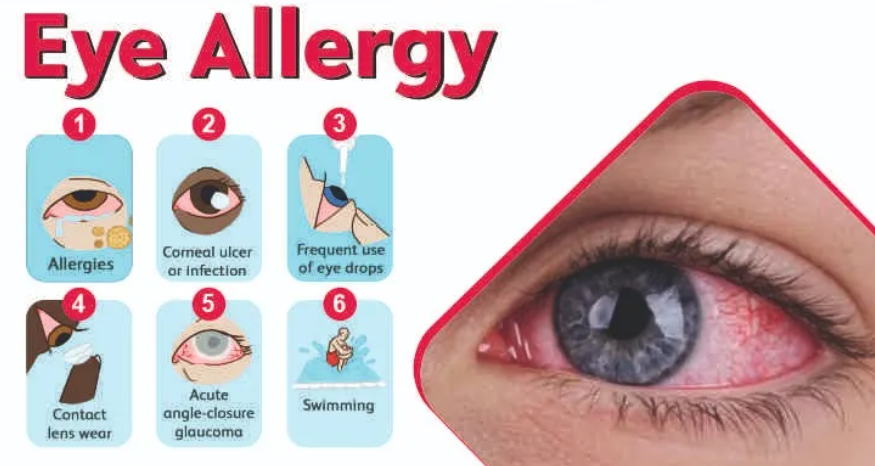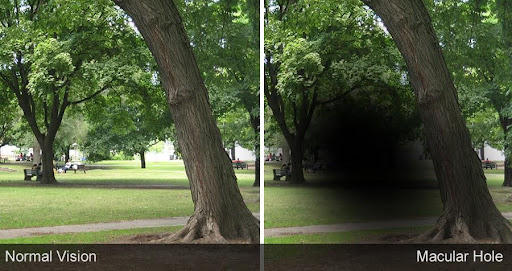Eye allergy, also known as ocular allergy, refers to the body’s hypersensitivity to specific allergens that come into contact with the eyes. When these allergens, such as pollen or pet dander, make their way into the eyes, they trigger an immune response, leading to uncomfortable symptoms.
Untreated eye allergies can cause an inflammatory response in the tissues. It is imperative to consult with an expert ophthalmologist, such as Dr. Paik Dong Won or Dr. Jung Sae Rom, to treat your condition effectively.
Causes and Risk Factors
Some of the causes and risk factors associated with an eye allergy are the following:
Causes
- Allergen exposure – Pollen, dust mites, mold spores, pet dander, and certain cosmetics primarily trigger ocular allergies. These allergens come into contact with the eyes’ sensitive tissues, leading to an immune response.
- Histamine release – When allergens interact with the eyes, the immune system releases histamines and other chemicals. Histamines cause blood vessels in the eyes to dilate, leading to redness, itching, and watery eyes.
- IgE antibodies – Individuals with ocular allergies produce higher levels of immunoglobulin E (IgE) antibodies in response to specific allergens. These antibodies attach to mast cells, which release histamines upon allergen exposure.
Risk Factors
- Personal or family history – If you have a history of allergies, asthma, or eczema, you are more likely to develop ocular allergies. These conditions share a common underlying allergic predisposition.
- Environmental Allergen Exposure – Living in environments with high levels of allergens, such as pollen-rich areas or homes with pets, increases the risk of developing ocular allergies.
- Seasonal factors – Seasonal allergies, often triggered by pollen, can lead to seasonal ocular allergies. Pollen counts tend to be higher during certain times of the year, exacerbating symptoms.
- Indoor allergens – Exposure to indoor allergens like dust mites, mold spores, and pet dander can also contribute to developing ocular allergies, especially in individuals spending extended periods indoors.
- Contact lens wear – People who wear contact lenses may be at higher risk of ocular allergies due to potential allergen accumulation on the lenses or decreased tear exchange under the lens.
- Cosmetic use – Some cosmetics, such as eye makeup or contact lens solutions, may contain allergens that can trigger allergic reactions in sensitive individuals.
- Occupational exposure – Certain occupations that involve exposure to irritants or allergens, such as chemicals or dust, may increase the risk of ocular allergies.
- Air quality – Poor air quality, especially in urban areas with pollution, can contribute to the prevalence and severity of ocular allergies.
- Age – Ocular allergies are common in children and young adults but can occur at any age.
- Gender – Some studies suggest females may be more prone to developing ocular allergies than males.
Several risk factors, including genetic predisposition, environmental exposure, and lifestyle choices, can increase the likelihood of developing this condition. It is crucial to have regular eye examinations with a trusted eye center, such as Eyeonce Eye Clinic in Seoul, South Korea, to determine possible interventions that best suit your condition.
Symptoms
Ocular allergy symptoms may vary in intensity and duration, but they all share a theme of causing irritation and discomfort.
- Itchy eyes – One of the hallmark symptoms of ocular allergies is persistent itching in and around the eyes. This itching sensation can be intense and often leads to the instinctive urge to rub the eyes.
- Redness – Ocular allergies can cause the blood vessels in the conjunctiva (the transparent layer covering the white part of the eye) to become inflamed and dilated. As a result, the eyes may appear red and bloodshot.
- Watery eyes – Excessive tearing, or epiphora, is a frequent symptom of ocular allergies. The eyes produce more tears to flush out the irritating allergens. As a result, the eyes may appear watery or teary, even if the individual is not experiencing sadness or emotional distress.
- Burning sensation – Many individuals with ocular allergies report experiencing a burning or stinging sensation in their eyes. This discomfort can be exceptionally bothersome, adding to the overall unpleasantness of the condition.
- Swelling – Swelling of the eyelids or conjunctiva can occur as a response to the allergens. This swelling can contribute to a puffy or swollen appearance of the eyes, making individuals look fatigued.
- Sensitivity to light (photophobia) – Some people with ocular allergies may become more sensitive to light, a condition known as photophobia. Exposure to natural and artificial bright lights can cause discomfort and a need to squint or shield your eyes.
- Blurred vision – This can occur due to the excessive tearing and discomfort caused by ocular allergies. However, the blurriness is usually temporary and improves once the allergens are removed from the eyes.
- Gritty or foreign body sensation – Individuals with ocular allergies might feel as if there is a foreign object or grittiness in their eyes. This sensation is due to the irritation caused by the immune response and the presence of allergens.
- Stringy discharge – Some individuals may experience a stringy or mucus-like discharge from their eyes due to the inflammation and irritation caused by ocular allergies.
If you suspect having ocular allergies, book an appointment with Eyeonce Eye Clinic. Their ophthalmologists offer several custom-fitted preventive measures and treatment options to address your needs.
Diagnosis and Treatment
Proper diagnosis and treatment are essential for effectively managing these allergies and finding relief. Eyeonce, a comprehensive approach to eye care, offers various methods and treatment options to help individuals overcome the challenges posed by ocular allergies.
Diagnosis
- Comprehensive eye examination – A thorough eye examination by our expert eye care professional is the first step in diagnosing ocular allergies. It includes assessing the eyes’ health, evaluating symptoms, and discussing the patient’s medical history.
- Allergy testing – Allergy testing, such as skin prick or blood tests, can identify specific allergens triggering the allergic reaction. This information helps customize treatment plans and allergen avoidance strategies.
- Tear film analysis – Tears play a vital role in eye health. Teat film analysis can reveal abnormalities in tear composition, indicating inflammation or allergic responses.
- Conjunctival smear – Collecting a sample from the conjunctiva, the transparent tissues covering the eye’s surface, can reveal the presence of eosinophils, a type of white blood cell associated with allergies.
Treatment
- Allergy drops – Eyeonce offers specialized allergy eye drops that provide targeted relief for ocular allergies. These drops contain antihistamines and other active ingredients that alleviate itching, redness, and irritation.
- Avoidance strategies – Identifying and avoiding allergens is crucial. Eyeonce guides minimizing exposure to allergens, whether outdoor pollen or indoor irritants like dust mites or pet dander.
- Cold compresses – Applying cold compresses can soothe inflammation and reduce itching. Eyeonce recommends using a clean, damp cloth over closed eyelids for comfort.
- Prescription medications – Eyeonce may prescribe more substantial antihistamine eye drops or corticosteroids to manage inflammation and alleviate symptoms.
- Immunotherapy – Eyeonce may recommend immunotherapy for persistent and severe ocular allergies. This treatment involves gradually exposing the patient to small allergens to build tolerance.
Our eye care professionals also suggest having lifestyle modifications, observing proper hygiene practices, and submitting to regular follow-ups. Eyeonce brings clarity to managing ocular allergies, helping patients regain comfort and enjoy clear vision.
Why choose Eyeonce Eye Clinic Gangnam for ocular allergy treatment?
Utmost Patient Care
Our eye care professionals and staff ensure to give you your money’s worth. We guarantee you receive the best medication possible and assure you that you are guided and understood, making you feel comfortable and confident at every step.
Comprehensive Consultation
Eyeonce Eye Clinic offers comprehensive eye examinations to evaluate your condition and determine the best ocular allergy treatment. Our ophthalmologists take their time to cater to your questions and address your concerns, ensuring you make an informed decision about our vision correction options.
Expert Eye Doctors
Our ophthalmologists, Head Director Dr. Paik Dong Won and Medical Director Dr. Jung Sae Rom, are highly knowledgeable and adept in treating ocular allergies. They always use the latest techniques and technologies to ensure optimal results.
Frequently Asked Questions
Immunotherapy, such as allergy shots or sublingual tablets, can provide long-term relief by desensitizing the immune system to allergens.
If over-the-counter treatments do not provide relief or symptoms worsen, it is advisable to consult an eye care professional for proper evaluation and treatment.
Ocular allergies themselves do not typically lead to vision loss. However, persistent rubbing and itching of the eyes can potentially contribute to eye irritation and discomfort.
Conclusion
With their uncomfortable symptoms, ocular allergies can disrupt daily life and hinder the enjoyment of clear and comfortable vision. The journey to managing and alleviating these allergies is a path that leads to improved eye health and overall well-being. With knowledge, personalized care, and innovative solutions, individuals can find comfort and clarity through Eyeonce Eye Clinic. Book an appointment with them today!



